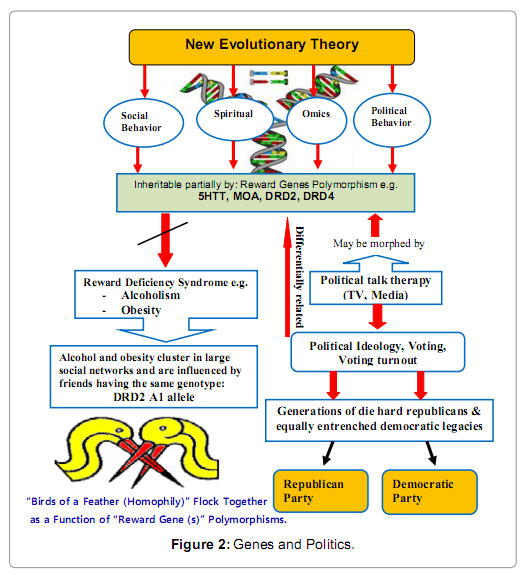That old proverb, "Birds of a feather flock together", even has a science-y term attached to it; homophily, coined in the 1950s by sociologists who felt a need to jargon up old-timey proverbs, it means, basically, 'love of the same'. Though the researchers in a new review get medieval, mostly as a way to endorse an anti-Catholic sentiment, quoting the Olde English “Byrdes of on kynde and color fok and fyeallwayes together.”
This group of researchers contends that because people who exhibit certain types of behaviors, like drug addiction, smoking, juvenile delinquency, ADHD (and more!) tend to hang out with and even marry other people who also do that stuff, it is because they have the same gene for a disorder called "Reward Deficiency Syndrome" (RDS) and not because they just don't want to be judged for getting hammered drunk and missing work the next day. People who get drunk a lot and eat too much, for example, tend to have the DRD2 A1 allele, while voter turnout and ideology are linked to 5HTT, MOA, DRD2, and DRD4. Are you a rich, Republican white guy? You must have the DRD2 A2 and the DRD4 7R alleles.
Holistic Darwinism, at last! Let's start testing. Wait, you're skeptical? It's a review in a journal, people, and it must be accurate because they invoke Rachel Maddow's television show. If they had mentioned Bill O'Reilly for credibility, you might have cause to worry about the science in the paper, but Maddow probably has the correct genetic makeup in her brain. Heck, someone could write a whole book on this topic if they found some social psychology surveys to flesh it all out.
They say that the specific genetic traits they list may predispose people to preferences for all kinds of religious, political and social behaviors - which means we might someday be able to breed out people who get Emo haircuts or become Hare Krishnas. And it may explain some odd things right now. Perhaps former Senator John Kerry was born a Catholic Democrat who nonetheless supports abortion and likes to buy gas-guzzling SUVs. It's not his fault, he just has a bunch of different reward gene polymorphisms bouncing around.
This review has led the authors to create a New Evolutionary Theory, which always delights evolutionary biologists.

Luckily for Europe and Asia, since the biological outcomes are Democrats and Republicans, this New Evolutionary Theory only applies to America. That means other parts of the world are safe from what I call "Americanepigenetics", at least until we start seducing their women. Credit: Genetic Syndromes &Gene Therapy
Their findings also suggest that this genetic information may predict presidential outcomes more than the actual issues or even the candidates themselves. Let's hope so, because if the science positions of Romney and Obama were the determining factor all of academia would vote Other - but since it is apparently genetic and only Democrats are born super-smart enough to be scientists, I predict that once again Barack Obama will get 90% of the university vote.
But even fiscal conservatives should regard that notion, and this review article and its New Evolutionary Theory, as good news; since both candidates are refusing public financing this time around (instead of just the winner in 2008 doing so and outspending his opponent two-to-one) we may be looking at a $2 billion presidential election. If we can simply map the genome of everyone and pick a winner based on that it would be much cheaper and we could instead buy essential stuff with the savings, like Navy Railguns and more studies of Everquest 2.
According to the paper, they can link voting, voter turnout and political ideology to these various reward genes, possibly predicting liberalism or conservatism. I won't rehash the entire list of studies reviewed to make their claim, the paper is open access (thank you for that) and you can see the details for yourself in the link at the bottom.
"For example, people with a particular genetic makeup may be more trusting and therefore more likely to join a political party than people with a different genetic makeup," explained Marlene Oscar Berman, PhD, Professor of Anatomy&Neurobiology, Professor of Psychiatry, and Professor of Neurology at Boston University School of Medicine (and also Affiliate Professor of Psychology at Suffolk University). "Further, this genetic association with partisanship also mediates an indirect association with voter turnout, and also might help to explain similarities in parent/child and child partisanship and the persistence of partisan behavior over time. In addition, it explain the prevalence of generations of die-hard republicans and equally entrenched democratic legacies."
So go on and believe in free will if you want, but if you continue to dispute the clear relationship between political persuasion and biology, you are probably a Holocaust (and Global Warming)-denying Flat Earther who only understands complex concepts in a False Equivalence way and is outside the reality-based community; i.e., you are a Republican who couldn't understand all my important science words anyway.
But there is hope. Democrats intend to be benevolent biological overlords. "The study of genes potentially promises a better understanding of the constraints imposed on basic political behavior. Thus, biologists and political scientists must work together to advance a new science of human nature, and we encourage large scale studies to confirm the results of our reports," said Berman.
I don't want psychiatrists to think my title is picking on them; so I will note that one of the authors is instead a holistic addiction therapist in Miami.
Citation: Kenneth Blum, Marlene Oscar-Berman, Abdalla Bowirrat, John Giordano, Margaret Madigan, Eric R. Braverman, Debmayla Barh, Frank Fornari, Joan Borsten and Thomas Simpatico, 'Neuropsychiatric Genetics of Happiness, Friendships, and Politics: Hypothesizing Homophily (“Birds of a Feather Flock Together”) as a Function of Reward Gene Polymorphisms', Genetic Syndromes&Gene Therapy doi: 10.4172/2157-7412.1000112





Comments